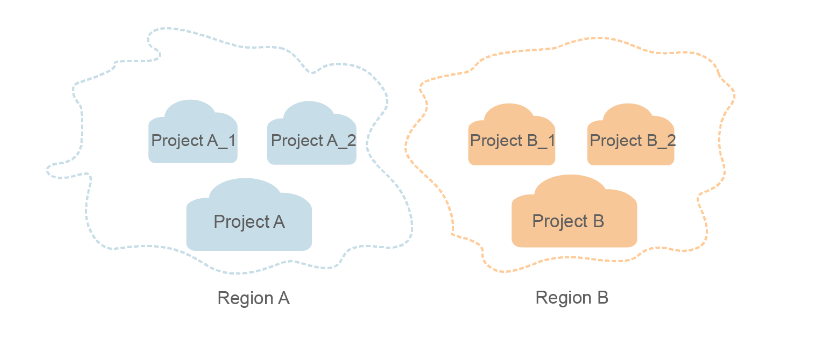Concepts
- Account
An account is created upon successful registration. The account has full access permissions for all of its cloud services and resources. It can be used to reset user passwords and grant user permissions. The account is a payment entity and should not be used directly to perform routine management. For security purposes, create users and grant them permissions for routine management.
- User
An IAM user is created by an account in IAM to use cloud services. Each IAM user has its own identity credentials (password and access keys).
- Region
Regions are divided based on geographical location and network latency. Public services, such as Elastic Cloud Server (ECS), Elastic Volume Service (EVS), Object Storage Service (OBS), Virtual Private Cloud (VPC), Elastic IP (EIP), and Image Management Service (IMS), are shared within the same region. Regions are classified as universal regions and dedicated regions. A universal region provides universal cloud services for common tenants. A dedicated region provides services of the same type only or for specific tenants.
- Availability Zone (AZ)
An AZ comprises one or multiple physical data centers equipped with independent ventilation, fire, water, and electricity facilities. Compute, network, storage, and other resources in an AZ are logically divided into multiple clusters. AZs within a region are interconnected using high-speed optical fibers to support cross-AZ high-availability systems.
- Project
Projects group and isolate compute, storage, and network resources across physical regions. A default project is provided for each region, and subprojects can be created under each default project. Users can be granted permissions to access all resources in a specific project. For more refined access control, create subprojects under a project and purchase resources in the subprojects. Users can then be assigned permissions to access only specific resources in the subprojects.
Figure 1 Project isolation model
Feedback
Was this page helpful?
Provide feedbackThank you very much for your feedback. We will continue working to improve the documentation.See the reply and handling status in My Cloud VOC.
For any further questions, feel free to contact us through the chatbot.
Chatbot





